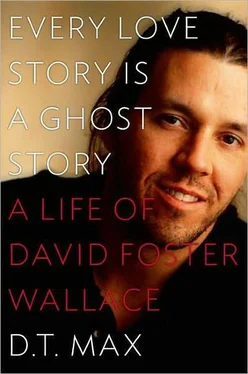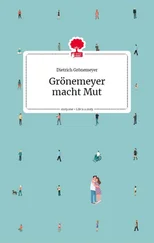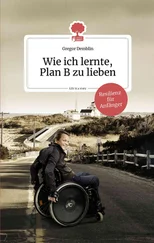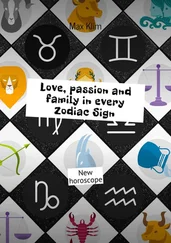But now he wondered if his resistance toward a more supportive idea of the writer’s relationship with the reader wasn’t the cause of his blockage. He responded to Franzen:
I’d love to hear more on what “humble, unpaid work an author does in the service of emotion and human image” is…. And how, as a vastly overselfconscious writer, might one still go on having faith and hope in literature and some kind of pleasure…? I admit it: I want to know. I have no clue. I’m a blank slate right now. Tabula rasa or whatever.
He reluctantly acknowledged that he might suffer from “a basically vapid urge to be avant-garde and poststructural and linguistically calisthenic — this is why I get very spiny when I think someone’s suggesting this may be my root motive and character; because I’m afraid it might be.” 7
Wallace’s stay at Granada House finished in June. Where he chose to go next, he knew, would be important. He had not drunk alcohol or gotten high for seven months. He considered Somerville, Urbana, and Arizona, but instead moved into a transitional facility on Foster Street, just a few blocks away, with Big Craig and two other men from Granada House. The “sober house,” as it was called, was split into men’s and women’s sections. The residents spent most of their time at work and the building had an empty feel compared to Granada House — Amy Wallace visited and found it remarkably clean, considering more than a dozen adults lived there. When the other residents went off to their jobs, Wallace would head for the library in bandana with knapsack to spend the day trying to write. He still did not feel well. He wrote David Markson that he was “so blank and depressed and befogged” that he couldn’t even tell if he liked what he was reading . He and Costello went around Harvard Yard, Wallace showing his friend all the places he had tried to study when he was a graduate student and failed. When he got to Emerson he said he often thought of throwing himself down the stairs. With his friend Debra Spark he went to his Somerville apartment and emptied his things out. He threw out books and piles of manuscripts and drove his computer to the Costello family house in Winchester, Massachusetts. Spark urged him not to throw the material out, saying he’d want it later. “I cannot sit still,” he wrote Markson, “can barely read, and have thoughts that don’t race so much as intertwine in a boily and clotted and altogether nauseous way. Fiction-wise I’m dead in the water.” How he yearned, he said, for “just one tall cool frosted bar-glass of Wild Turkey.” For his nine-month anniversary of sobriety, in July, Wallace’s sponsor gave him a Jolly Pecker, “a squat little fireplug of a phallus, with feet, which when you wind it up hops up and down in a plaintive eager way that just breaks hearts. It seems to capture my state…so aptly I can’t even be bothered to think the guy’s a dork.” 8
Wallace had paid $20 a week in rent at Granada House. He had had few other costs as he worked to kick his addiction. But now he was facing the ordinary expenses of a Boston-area resident. Book reviews paid a trifle; he had no grant money left. He was back against the old problem that if he taught he might not write but if he didn’t teach he would not eat. It was the one thing he knew he knew how to do, the only thing he thought he could do. Determined to stay in Boston, where he had made a new beginning, he applied to Tufts and Harvard as a creative writing instructor.
Someone new came into his life now, as if to counter this disappointment: Mary Karr, a poet. The Texan-born Karr was in her mid-thirties, seven years older than Wallace. She lived in Belmont with her husband and young son, drove a station wagon, and had the stability and the grit that Wallace felt he lacked. They had in fact met once at a party before he’d gone to McLean and he’d been very taken with her; she was witty and had a raunchy vocabulary. Soon after he moved out of McLean, he saw her at a meeting in Harvard Square. That she was a recovering alcoholic too seemed like serendipity. He quickly grew infatuated. When his friend Mark Costello came up to visit him, the two waited in the back of a meeting hall in the hope that this extraordinary woman would come by. (She did and seemed pleasant but harried to Costello, who was used to his friend’s exaggerations.) 9There were warnings Wallace was well aware of against pursuing another person newly in recovery. (Ignoring the prohibition is derided by members as “thirteenth stepping.”) 10It did not matter to him: here was a kindred spirit, another writer struggling to surrender to a greater power but for whom phrases like “One day at a time” and “Do what’s in front of you to do” hurt the brain.
Deb Larson counseled Karr and Karr also volunteered at Granada House, so Wallace often had occasion to see her. Immediately, he wanted to be involved, but Karr, who was in a shaky marriage and trying to protect her son, says she had no interest. She sensed instability and trouble. “We were both just shocking wrecks,” she remembers; he bragged that he had perfect SATs, and called her Miss Karr “in this obsequious, Charlie Chanish fawning kind of way.” He saw her, she realized, as some sort of mother/redeemer figure.
Wallace did not hear subtle variations in no; he knew only one way to seduce: overwhelm. He would show up at Karr’s family home near McLean to shovel her driveway after a snowfall, or come unannounced to her recovery meetings. Karr called Deb Larson and asked her to let Wallace know his attentions were not welcome. Wallace besieged her with notes anyway. He called himself Sorrowful Werther. She was “Sainte Nitouche,” the saint who cannot be touched, a reference to her favorite book, Anna Karenina . She felt an affinity for him, considered him brilliant but also unsound. One day, she remembers, he arrived at a pool party she was at with her family with bandages on his left shoulder. She thought maybe he had been cutting himself and wouldn’t show her what was underneath — a tattoo with her name and a heart. He called Walden, with whom he was not much in contact anymore, to tell her what he had done. He clearly felt he had made a commitment there was no retreating from. The details of the relationship were not clear to others though: Wallace told friends they were involved, Karr says no.
Karr did not admire Wallace’s writing. She read Girl with Curious Hair and “told him it was not a great book,” she remembers, praising only “Here and There”: “His interest in cleverness was preventing him from saying things.” She advocated more direct prose. 11But Karr was not impervious to his restless mind and contacted a friend who ran the writing program at Emerson College, DeWitt Henry, to recommend Wallace for a job there and assure him that if he proved too unstable to teach the class, she would step in. Henry agreed to take Wallace on as an adjunct professor in the fall of 1990.
In that month he began his reluctant return to academia. He took the Green Line subway to Emerson, “a hip kids’ college in the Back Bay,” as he described it to Markson. The combined rejection of the stories he most admired by the two people whose opinions he admired most — Franzen and Karr — was beginning to tell. When DeWitt Henry put up an advertisement for Girl with Curious Hair on a bulletin board, Wallace pulled it down, saying he was embarrassed by the book. A few weeks into the semester Wallace checked in with Franzen. “Teaching is going OK,” he wrote his friend. “I’d forgotten how young college students are. They’re infants, though: you can see the veins in their little eyelids, you almost have to cradle their heads to help their necks support the skull’s weight.” He found he was popular, known for a loose style and an appealing willingness to digress. “We spend most of our time talking about Twin Peaks and The Simpsons so they think I am an okay caballero,” he told Markson. This was clearly a very different approach than the one he had taken at Arizona and Amherst, where his commitment to his students was preternatural and even a little maniacal, but Wallace was tired and confused: the stage didn’t feel like a stage without drugs and alcohol; it felt like a classroom.
Читать дальше












